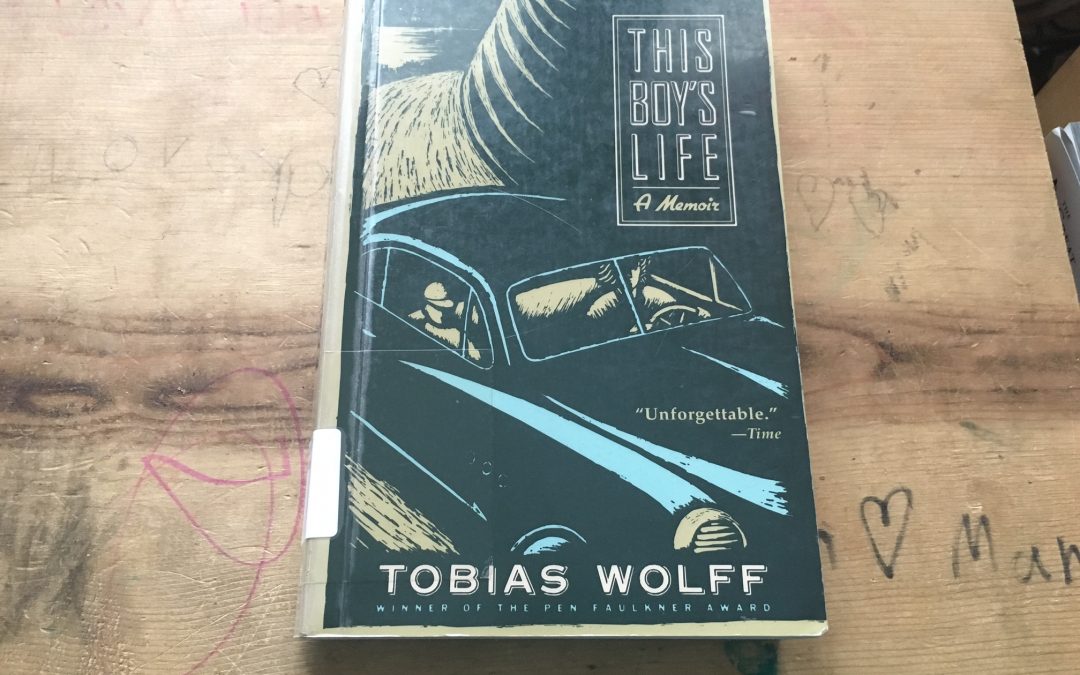One of the most entertaining memoirs I’ve read in a while is Tobias Wolff’s This Boy’s Life. Wolff provides such a clear picture of a boy’s life during the 1950s that I found I couldn’t put this book down. He lived his childhood during the time my grandmother would have lived hers, and as he shared more about the beliefs, customs, and intricacies of the period, I found myself understanding more about my grandmother.
This is the power of reading.
Wolff has a way with the pen; he creates such a vivid picture of his life that a reader feels they are right there, even if they weren’t even born yet. Take the opening section, for example:
“Our car boiled over again just after my mother and I crossed the Continental Divide. While we were waiting for it to cool we heard, from somewhere above us, the bawling of an airhorn. The sound got louder and then a big truck came around the corner and shot past us into the next curve, its trailer shimmying wildly. We started after it. ‘Oh, Toby,’ my mother said, ‘he’s lost his brakes.’
Not only is this a vivid description of place and situation, but it’s also an amazing use of tension. What’s going to happen to the driver who lost his brakes? Well, you’ll have to read it to find out.
Here are three things I enjoyed most about this book:
1. The characterization. Wolff is an expert in characterizing the people in his life, proving that he was a master of observation and human nature. Some of the characters were so extreme that, for a second, I doubted them, but then he’d introduce specifics, and it was impossible not to believe him.
Here’s his description of his stepfather, which is both slightly disturbing and sad:
Dwight drove in a sullen reverie. When I spoke he answered curtly or not at all. Now and then his expression changed, and he grunted as if to claim some point of argument. He kept a Camel burning on his lower lip. Just the other side of Concrete he pulled the car hard to the left and hit a beaver that was crossing the road. Dwight said he had swerved to miss the beaver, but that wasn’t true. He had gone out of his way to run over it. He stopped the car on the shoulder of the road and backed up to where the beaver lay.
We got out and looked at it. I saw no blood.The beaver was on its back with its eyes open and its curved yellow teeth bared. Dwight prodded it with his foot. “Dead,” he said.
It was dead all right.
There’s much more to this scene, but it’s worth reading to discover the delight of Wolff’s characterization.
2. The insight into a young boy’s life. Wolff was not shy about sharing the antics, the crazy thoughts, the wild things he did and the reasons—or lack of reasons—he did what he did. I found this especially engaging, considering I’m the mother of a tribe of boys.
3. The cultural time period. Wolff was a kid who was not wealthy (but longed to be), growing up in a world where women did not have much. He had a single mom, and her only real option was to stay with a man who isn’t good to her, at least until her son left home. It was a different time altogether, but one that should not be forgotten.
Probably my favorite part of this book were the last lines. It doesn’t really count as a spoiler, so I’ll share them:
“The air grew clearer as we climbed, and colder. The curves followed fast on one another as the road took the snaky shape of the river. We could see the moon now, a thin silver moon swinging between the black treetops overhead. Chuck kept losing the radio station.Finally he turned off the radio, and we sang Buddy Holly songs for a while. When we got tired of those, we sang hymns. First we sang, ‘I Walk to the Garden Alone’ and ‘The Old Rugged Cross’ and a few other quiet ones, just to find our range and get in the spirit. Then we sang the roof-raisers. We sang them with respect and we sang them hard, swaying from side to side and dipping our shoulders in counterpoint. Between hymns we drank from the bottle. Our voices were strong. It was a good night to sing and we sang for all we were worth, as if we’d been saved.”
The book mentioned above has an affiliate link attached to it, which means I’ll get a small kick-back if you click on it and purchase. But I only recommend books I enjoy reading myself. Actually, I don’t even talk about books I didn’t enjoy. I’d rather forget I ever wasted time reading them. (But if you’re curious whether I’ve read something and what I thought about it, don’t hesitate to ask.)


